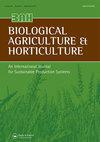Growth responses of garden cress (Lepidium sativum L.) to biodynamic cow manure preparation in a bioassay
IF 1.6
4区 农林科学
Q3 AGRONOMY
引用次数: 4
Abstract
ABSTRACT Natural substances are extensively used as biostimulants in agriculture. Notably, horn-manure preparation (HMP) is fermented cow manure sprayed at low concentrations onto biodynamically cultivated fields. The present study investigated the effect of HMP on the growth of garden cress (Lepidium sativum L.) cultivated in a bioassay (randomized block design, n = 20). Seedlings were cultivated in a water medium. Treatments of a drop of HMP suspension (1 µl or 0.1 µl) or of water (Control) were added to the medium. Long-term series of trials, with two different HMPs, were conducted over 18 and 9 months with 76 and 38 trials, respectively. In the first series, the effect of a 1 µl drop of HMP suspension on root growth was significant overall (−2.4%, p = 0.004, Tukey-Kramer-test) and in 35.5% of the individual trials (p < 0.05). However, the effects fluctuated strongly between the trials (from −25.7% to +19.1%). The effect of a 0.1 µl drop was similar, but lower in magnitude. The results of the second series were analogous. Comparison of statistical models provided significant evidence of a growth-stabilising effect. An additional series of 22 negative control trials indicated an acceptable false positive rate. It was concluded that HMP, at low doses, significantly influenced root growth at early stages, with a stabilising pattern of action. Further development of the bioassay should improve its power and stability over time. A stabilising effect may induce an increased resilience of the agricultural system.芥蓝对牛粪制剂的生长响应
天然物质在农业中被广泛用作生物刺激素。值得注意的是,牛粪制剂(HMP)是将发酵的牛粪以低浓度喷洒在生物动力栽培的田地上。本研究采用随机区组设计(随机区组设计,n = 20),研究了HMP对栽培的园菜(Lepidium sativum L.)生长的影响。幼苗在水培养基中培养。在培养基中加入一滴HMP悬浮液(1µl或0.1µl)或水(对照)。两种不同hmp的长期系列试验,分别进行了18个月和9个月的76次和38次试验。在第一个系列中,1µl HMP悬浮液对根生长的影响总体显著(- 2.4%,p = 0.004, tukey - kramer检验),个别试验的影响为35.5% (p < 0.05)。然而,试验之间的影响波动很大(从- 25.7%到+19.1%)。0.1µl的下降效果相似,但幅度更小。第二个系列的结果是类似的。统计模型的比较提供了增长稳定效应的重要证据。另外22个阴性对照试验表明假阳性率是可以接受的。结论是,低剂量的HMP在早期阶段显著影响根的生长,并具有稳定的作用模式。随着时间的推移,生物测定法的进一步发展应该会提高其功效和稳定性。稳定效应可能会提高农业系统的恢复力。
本文章由计算机程序翻译,如有差异,请以英文原文为准。
求助全文
约1分钟内获得全文
求助全文
来源期刊
CiteScore
3.30
自引率
6.70%
发文量
18
审稿时长
>36 weeks
期刊介绍:
Biological Agriculture & Horticulture aims to act as the central focus for a wide range of studies into alternative systems of husbandry, and particularly the biological or organic approach to food production. The Journal publishes work of a sound scientific or economic nature related to any aspect of biological husbandry in agriculture, horticulture and forestry in both temperate and tropical conditions, including energy and water utilization, and environmental impact.

 求助内容:
求助内容: 应助结果提醒方式:
应助结果提醒方式:


